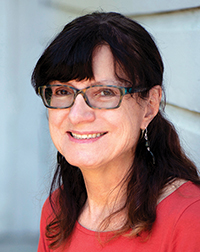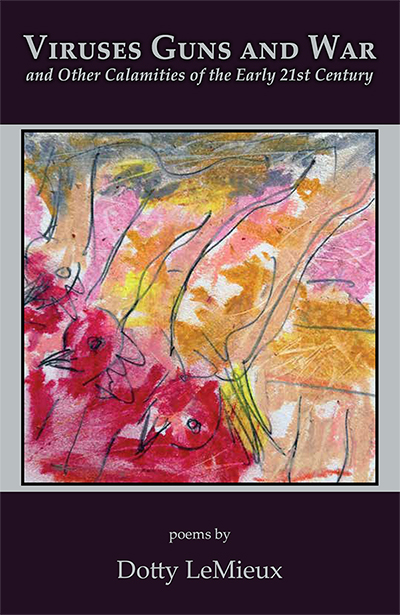Viruses Guns and War
and Other Calamities of the Early 21st Century
poems by
Dotty LeMieux
~44 pages, $13 (+ shipping)
Release Date: March 29, 2023
The Advance Sale Discount price on this title has expired. For those who prefer to pay by check, the price is $17/book (which includes shipping) and should be sent to: Main Street Rag, PO BOX 690100, Charlotte, NC 28227-7001.
PLEASE NOTE: Ordering in advance of the release date entitles the buyer to a discount. It does not mean the book will ship before the date posted above and the price only applies to copies ordered through the Main Street Rag Online Bookstore.
 Dotty LeMieux is the author of four chapbooks, Five Angels (Five Trees Press), Let Us Not Blame Foolish Women (Tombouctou Books) The Land (Smithereens Press), and I Ask Not Good Fortune (Finishing Line Books). She edited the iconic Bolinas literary journal Turkey Buzzard Review in the 1980s, along with the poets and artists of the town. Her work has appeared in numerous print and online journals and anthologies. Dotty lives in Northern California, where she practices environmental law and helps elect progressive candidates to office.
Dotty LeMieux is the author of four chapbooks, Five Angels (Five Trees Press), Let Us Not Blame Foolish Women (Tombouctou Books) The Land (Smithereens Press), and I Ask Not Good Fortune (Finishing Line Books). She edited the iconic Bolinas literary journal Turkey Buzzard Review in the 1980s, along with the poets and artists of the town. Her work has appeared in numerous print and online journals and anthologies. Dotty lives in Northern California, where she practices environmental law and helps elect progressive candidates to office.
Dotty LeMieux’s poetry collection, [Viruses Guns and War], asks us to consider an eclectic array of familiar tragedies—community and conflict, the fear of contact and yearning for love, white supremacy, a dearth of empathy, abortion. . . . Ultimately, the poetry asks, can we reclaim normalcy or does it no longer exist? In response, LeMieux’s poetry reminds us that art—creating it and consuming it—is sometimes the only reasonable answer. ~Kit-Bacon Gressitt
Dotty LeMieuux’s poems are vivid, insightful, lyrical, scathing, tender, and at times devastating—as in what happens to a brown-skinned boy with a toy gun out for a walk in the sun. These are poems of and for our fraught times, full of virus, violence, and war, but also coyotes, sunflowers, and owls. A deeply satisfying read. ~Priscilla Long, author of Holy Magic: Poems and Crossing Over: Poems
Nineteen Ways of Looking at a Pandemic
after Wallace Stevens
1.
the sound a boulder makes
before beginning
its deadly downhill
roll
2.
sunflowers
in their art deco vase
track time by the sun
so well you can set
your watch by it
3.
hush, don’t wake
the old man sleeping
on the park bench
4.
one purple crocus
in my weedy front yard
5.
hey, what do you think
you’re doing?
don’t you know
you can’t play basketball
without touching?
6.
I’m calling the police!
7.
rain in spurts
taunting us between
the times of quiet
8.
why does standing in line at Safeway
for an hour and a half
remind me of the drought years?
9.
they loosened EPA regulations
so people can get back to work
polluting again
10.
the police are too busy
confirming deaths
on park benches
to answer calls
about unsanctioned basketball
games in the park
11.
Presidential Press briefing —
I told him — don’t return
her phone call; she’s not
nice to me
12.
the boy in California
who died
when the clinic
refused him entry
no insurance
13.
in New York the first buds
of April break through
hoping for someone
to admire them
14.
They’re not doing the tests;
they said to come back later —
blind man in the park smoking
15.
I can smell his smoke
16.
if you wonder where the homeless went
when they kicked them
out of the park
just check the far side
of the closed-down Community Center
17.
winter has been its own very long year
this year
18.
woman into phone, slumped
on the top step of her front porch —
they say the test won’t come back
for at least a week
19.
after all this,
spring
Sunflowers, Rain and the Plague
On the hutch
in front of my window
sunflowers slow dance
gaze through newly rain-washed
panes, moving together
in the artful confines
of their hand-blown
glass vase
their yearning yellow heads
tracking the sun,
the world outside,
lurch like drunken
ballerinas
blue rain asymmetric
as a heart
skipping a beat
In our flattened world
we eat three day old tuna salad
wash four day old
dishes so we can
do it all again
Once Plague was something
from history books
when hygiene was careless
for both the living
and the dead
Now we struggle
to remember
the day of the week
and to change the sheets
take out the trash
comb our tangles
as if the world were easing
into spring
like any other year.
When
all the old people are gone,
the ones who remember the First World War
or the Stock Market crash or the Holocaust
when the Vietnam vets have vanished
from their street corners,
the COVID survivors dead
from natural causes,
when the books they wrote and diaries they kept,
the photographs they took and preserved
in albums and basements and attics
and the films they made
with their 8 mm home cameras
when all these are all worm-eaten or ground
to dust or destroyed by fire or flood,
or unraveled on their spools,
the museums torn down for
housing blocks no one lives in
offices no one goes to
and there is nothing left but the Cloud,
nothing, that is, but a warehouse somewhere
in Iowa or Nebraska or maybe Ukraine,
with little bits of replicating data
watched over by the robots
who manage them,
then who
will tell us our truths who
will be left to remember
that we were once human,
why we had to die?


 Dotty LeMieux is the author of four chapbooks, Five Angels (Five Trees Press), Let Us Not Blame Foolish Women (Tombouctou Books) The Land (Smithereens Press), and I Ask Not Good Fortune (Finishing Line Books). She edited the iconic Bolinas literary journal Turkey Buzzard Review in the 1980s, along with the poets and artists of the town. Her work has appeared in numerous print and online journals and anthologies. Dotty lives in Northern California, where she practices environmental law and helps elect progressive candidates to office.
Dotty LeMieux is the author of four chapbooks, Five Angels (Five Trees Press), Let Us Not Blame Foolish Women (Tombouctou Books) The Land (Smithereens Press), and I Ask Not Good Fortune (Finishing Line Books). She edited the iconic Bolinas literary journal Turkey Buzzard Review in the 1980s, along with the poets and artists of the town. Her work has appeared in numerous print and online journals and anthologies. Dotty lives in Northern California, where she practices environmental law and helps elect progressive candidates to office.